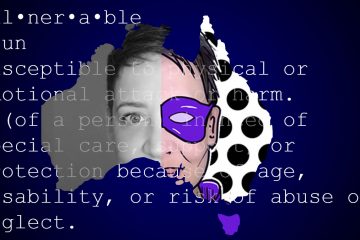Last week’s post was about working. Well, to be more accurate, not working. I wrote that I’d kicked a ‘hornet’s nest’ in order to leave work and, while this is true, it’s not the whole truth (there’s a difference). I didn’t just kick a hornet’s nest, I unleashed something akin only to giant murder hornets. And they were angry (relentless even), they chased me through countless hoops.
For a while, I’ve wanted to write about my experiences with the Department of Work and Pensions (DWP). Yet, I’m mindful that not only can this be a controversial and subjective topic, it can also be politically prickly. What follows may feel familiar to many people with epilepsy, in fact many people with invisible disabilities. It’s this that propels me to start the conversation. I dealt with the UK’s social security system, but these are not issues contained solely within the UK.
However, this is the Goldilocks Complex. So, I’m going to deal with all the above (and, let’s face it, probs’ a little a more) in the only way I know how: not too much politics and not too little politics, it’s gotta be just right.
From the age of 18, I worked full time. In my last role, I schlepped into the office, enduring a 45-minute commute each way, even when I’d experienced seizures the night before. I didn’t want to quit; I wasn’t ready to admit I couldn’t handle it anymore. In 2015, my hands were tied and I really-didn’t-want-to-but-had-to cut my working hours from 40 down to 24 each week. In one fell swoop I’d halved my salary, it became clear (pretty quickly) I was going to need some financial help.
Mission Impossible
And there is help available for those who need it. The UK government offers extra money to help with everyday life for those with an illness, disability or mental health condition. It’s a few pounds each month paid so people can maintain their personal independence. Whether you are working full-time, part-time or not working at all it is, theoretically, perfect.
Of course, this makes it sound like the benefits system we have in the UK is easy-peasy-lemon-squeezy. It’s not. For starters, there’s a sh*t-load of WTF-does-that-mean-paperwork; the NASA-approved-filing-system I have under my bed is testament to that (sorry Mum). Although, I do have to acknowledge we’re lucky to have something in place, however much it malfunctions.
And boy, does it malfunction, while on paper it appears impressive. The UK government has put the benefit in place specifically for people with any disability, illness or mental health condition, yet uses the same application process for everyone. Instantly, they’ve stacked the deck against people with invisible disabilities, and those with mental health conditions. It’s the same application form and assessment criteria for a person with epilepsy, cerebral palsy, PTSD, or bi-polar disorder.
The DWP designed the Personal Independence Payment to help with the ‘extra costs of living with a disability or long-term health condition’. The application form (which FYI, is a mere 33-pages) asks that you tick a box to explain how you manage daily activities (regular stuff, like washing and bathing, dressing and undressing). It requires information about how ‘your condition affects you in your day-to-day life’, about the things ‘you have difficulties with’. Yet, then goes on to state (specifically) ‘it’s not about your condition’.
Huh? That’s impossible, right?
One Size Does Not Fit All!
How do you make sure you cover how your condition affects you and not tell them about your condition? As a person with epilepsy, how do I explain that 95% of the time I rock at life but the other 5% includes days where I don’t get out of bed because of seizure-related fatigue? How do I let them know any of that when the application form is a one-size-fits-all-situation and doesn’t ask about my condition?
Epilepsy is not only about having difficulties with ‘day-to-day things’. It can feel all-consuming, like a suffocating pressure pushing from all sides, some days I don’t have the strength to push back. It’s about crawling, wriggling, squirming out from underneath, about being able to stand up and say, ‘I’m okay’. All while knowing, it’s not just highly likely but guaranteed, I’m gonna have a seizure. It’s not about whether it’s ‘sometimes, most of the time, or with help’ I’m able to make lunch!
Despite its flaws, I did apply successfully for this benefit in 2015 and, for nearly 18 months, I received the minimum award. It didn’t cross my mind to ask why they’d ignored a lot (read: almost all) of the information I’d provided. I was so grateful I’d ticked some of their boxes, it didn’t matter their boxes are the same for every person with any illness or disability. I was so thankful I’d got the answers ‘right’, I couldn’t see how ridiculous that statement is. The DWP had made a decision, additional funds were coming in, which meant I could remain part-time and pay the rent.
Oh, How I Love Receiving the Brown Envelopes
In September 2016, I received an all too familiar brown envelope in the post. It was the DWP writing to let me know my award was up for review. I had to complete a slightly-different-but-still-one-size-fits-all form and let them know what, if anything, had changed with the way my condition affected my daily life.
In the 17 months which had passed: I had cut my hours again at work because 24 was too tiring; I was taking different and additional medication; my seizures remained uncontrolled, were different and now more frequent; I’d needed a 10-day admission to a neurology ward to quickly remove one medication from my system, and go onto another.
Yup, things had changed, they’d deteriorated. The farcical thing is all these scary events I was dealing with then, and still manage now, didn’t matter to the DWP. These changes didn’t fit their tick-box application form. As far as the good ‘ol Department of Work and Pensions were concerned none of this ranked in their list-of-important-things when it comes to managing my condition.
This says so much about their lack of understanding regarding epilepsy and disabilities, one-size-fits-all didn’t then, doesn’t now and won’t ever work. Disabilities (invisible or otherwise), illnesses and mental health conditions are not malleable, they affect all individuals differently. That’s why many people either don’t get the benefits they deserve or have them taken away; they fall through bureaucratic cracks.
Face to Face with the Lesser-Spotted-Double-Panda
My review was scheduled for December 2016. 6 nights before I was due to go in, I’d had a seizure (in the bathroom) and landed, with a thwack, on my face. This resulted in the lesser-spotted-double-panda, I’d sat in front of the nurse with 2 black-eyes, an extremely visual indication of ‘how my condition affects me in my everyday life’. She acknowledged, as Mum and I walked in, the pain I must have gone through acquiring the bruises. We even discussed how often it happened; I’d thought she’d understood epilepsy is not solely about seizures.
She hadn’t.
Shortly afterwards, I received a letter from the DWP letting me know I no longer qualified for the benefit, and if I didn’t agree I should write. I found it difficult to understand how they’d reached their decision; I’d done the best I could in my face-to-face assessment. I’d tried to explain to the nurse that, ‘Well yeah, right now I could make a cup of tea (sounds great, 1 lump or 2)!? But, in the not-so-distant-past, I’d had a seizure while holding the kettle, and poured scalding water on my arm’. I’d tried to help her understand that the unpredictability of this condition makes it dangerous. I’d failed.
But I wasn’t done battling; I was living Under the Grind and this was my opportunity to fight. However much I wanted to, the process I needed to follow doesn’t (solely) involve screaming, shouting and stamping your feet. It’s with a ‘mandatory reconsideration’. Although, many say this name is mis-leading. One school of thought believes every single mandatory reconsideration request sent to the DWP is, as a matter of protocol, denied. All I knew was I had a case.
Situation Normal Aiming For … Just Right!
With brilliant support from Citizens advice, I drafted my letter. It was important I stuck to the facts, made sure I framed my reasons for disagreeing in terminology that was PG, and would benefit me as much as possible. The hardest part, the thing that had me staring at a blank screen for longer than is good for a person with epilepsy, was keeping the emotion out. I couldn’t rant, I couldn’t vent. This wasn’t about that, I had facts.
Geez, every cell in my body wanted to shriek and let them know the problems they’d caused. I wanted to yell, ‘I make sacrifices every day to make sure I function. Not ‘live’. Not ‘have fun’. Just function’. All the DWP wanted to know was whether I ‘could walk 50 metres without help’.
In February 2017, my doc signed me off work. I tried to hold my sh*t together using anything as a distraction, and there’d been a lot to keep my mind from the dark thoughts. Ironically, the DWP was invaluable at this point. In March, I heard back from them concerning my mandatory reconsideration request. Their decision remained the same and I immediately began drafting my grounds for appeal, relieved (more than anything) to have something to do.
This was my shot. My paperwork couldn’t have too much detail, I couldn’t stray into the realms of ‘over-emotional’. Similarly, I couldn’t have too few details, I had to fight. I had to ‘Goldilocks’ the sh*t out of my appeal, if anything needed to be ‘just right’ it was this.
But we’ll save that quest for next week!
Because having epilepsy is like being Goldilocks: you can’t have too much, you can’t have too little; everything has to be just right.
Copyright © Jo Mackenzie 2020



0 Comments